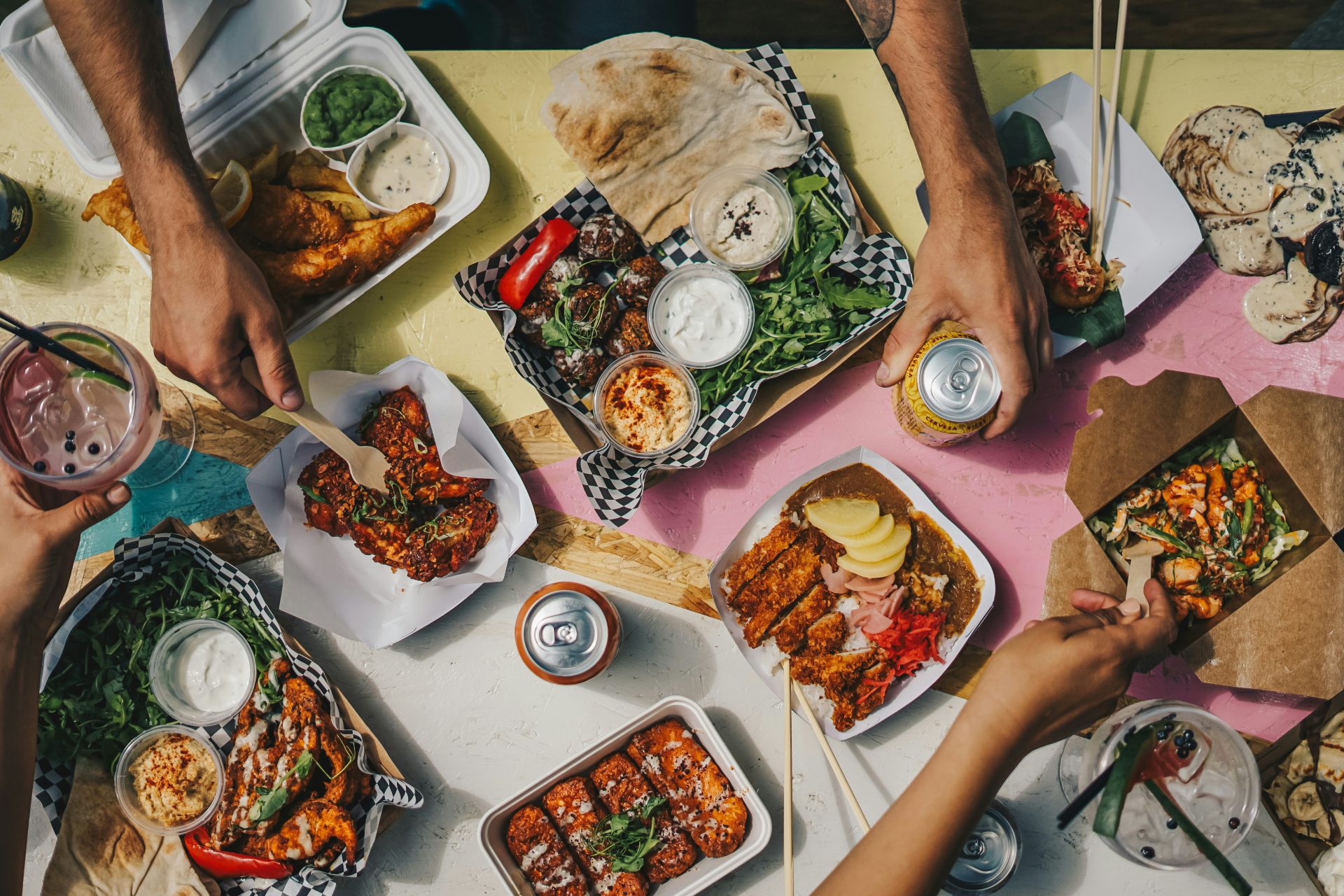Despite many restaurants offering fusion and Middle Eastern dishes in Ottawa, finding truly halal food can be challenging. This guide is for people who like halal food and want to know about its preparation standards.
What Makes a Restaurant Halal?
According to the Canadian Halal Bureau, a restaurant becomes halal following Islamic dietary laws in food preparation and ingredients.
For a restaurant to truly be halal, it must use meat from animals slaughtered according to Islamic law, avoid alcohol in cooking, prevent cross-contamination with non-halal items, since many food establishments are monitored by the organizations like the Halal Monitoring Authority (HMA) or the Islamic Food and Nutrition Council of Canada (IFANCC).
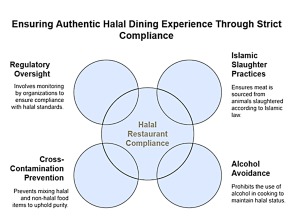
Key elements that make a restaurant halal include:
- Using only halal-certified meat and ingredients
- Avoiding alcohol in all cooking and food preparation
- Preventing cross-contamination with non-halal items
- Obtaining and maintaining official halal certification
- Training staff in halal food handling procedures
Halal Restaurant Requirements |
Description |
| Certified Meat Sources | All meat must come from halal-certified suppliers |
| Alcohol-Free Preparation | No cooking with wine, beer, or other alcoholic ingredients |
| Separate Preparation Areas | Prevention of cross-contamination with non-halal foods |
Understanding the Rules of Halal Food
Halal food establishments ensure that food meets Islamic dietary standards by monitoring ingredients, preparation methods, and storage practices.
In Ottawa, restaurants are checked through organizations that send inspectors to verify compliance with halal standards. This monitoring lets customers know that the food adheres to their religious requirements.
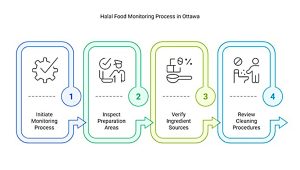
Components of the monitoring process include:
- Regular inspections of food preparation areas
- Verification of ingredient sources
- Review of cleaning procedures to prevent cross-contamination
What are the Rules of Halal Food?
Halal food rules start with permissible meats, including chicken, beef, lamb, and certain seafood, while pork and its derivatives are strictly prohibited.
According to Islamic Relief Canada, the animals must be slaughtered by a Muslim who recites “Bismillah” (in the name of Allah) while using a sharp knife to cut the throat in a way that allows blood to drain completely.
Additionally, halal food must be prepared with separate utensils, and non-halal food equipment must not be used to prevent cross-contamination.
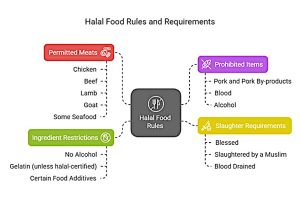
Core rules of halal food include:
Halal Food Rules |
Examples |
| Permitted Meats | Chicken, beef, lamb, goat, and some seafood |
| Prohibited Items | Pork and pork by-products, blood, and alcohol |
| Slaughter Requirements | The animal must be blessed, slaughtered by a Muslim, and the blood drained |
| Ingredient Restrictions | No alcohol, gelatin (unless halal-certified), or certain food additives |
How Do You Ask If a Restaurant is Halal?
Asking if a restaurant serves halal food requires straightforward questions. Ask “Do you serve halal food?” or “Is your meat halal-certified?”. It’s always good to confirm.
For partially halal menus, ask specifically which menu items meet halal standards. Restaurant staff in Ottawa are generally knowledgeable and happy to answer these questions.
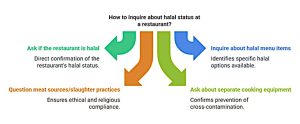
Effective ways to inquire about halal status:
- Ask directly if the restaurant is halal
- Inquire about which specific menu items are halal
- Ask about meat sources or slaughter practices
- Question, if separate cooking equipment is used for halal foods
What Food Ingredients are not Halal?
Non-halal ingredients include pork and pork by-products, alcohol and alcohol extracts, blood and blood products, and non-halal animal fat.
According to the Vegetarian Resource Group and The Guardian, many food additives, such as certain types of gelatin (from pork), L-cysteine (often from human hair or duck feathers), and some food colorings (containing insects), are also not halal.
Ottawa halal restaurants carefully avoid these ingredients to maintain their halal status.
What are the Common Haram Ingredients to Watch Out For?
When dining at halal food restaurants in Ottawa, be aware of common hidden non-halal ingredients.
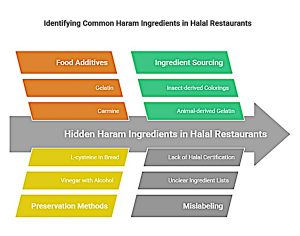
Ottawa’s halal restaurants carefully source ingredients to avoid these items, but if unsure, ask about specific dishes.
Hidden haram ingredients to be aware of:
- Carmine/cochineal (red food coloring from insects) (According to Global Islamic Academy)
- Gelatin in desserts, candies, and marshmallows (According to the Islamic Fiqh Council KSA)
- Some vinegars that may contain alcohol (According to IslamQA)
- L-cysteine in bread products (often derived from human hair or duck feathers, according to IslamQA)
Non-Halal Ingredient Category |
Examples |
| Animal-Based | Pork, blood products, non-halal animal fats, certain gelatins |
| Alcohol-Based | Wine, beer, vanilla extract, and some food flavorings |
| Hidden Ingredients | Certain food colorings, L-cysteine, and some cheeses with animal rennet |
Your Halal Food Ottawa Checklist
This simple checklist will make your search for halal food in Ottawa easier.
Essential steps to find authentic halal food in Ottawa:
- Research restaurants before visiting
- Ask specific questions about meat sources and preparation
- Try different cuisines that offer halal options
- Share your experiences with the Muslim community to help others
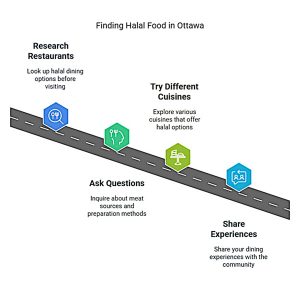
How to Enjoy Halal Food in Ottawa Canada with Confidence?
Enjoying halal food in Ottawa Canada requires knowing which questions to ask. Inquire about specific meat suppliers and preparation methods. Choose verified spots with good reputations in the Muslim community, as word-of-mouth remains a reliable indicator of authentic halal practices.
Supporting local Muslim-owned businesses helps ensure the continuous availability of quality halal options across Ottawa. Many established halal restaurants, like Khokha Eatery, have been serving the community for decades, building trust through consistent adherence to halal standards.
Why Ottawa is a Top City for Halal Cuisine in Canada?
Ottawa has become a leading city for halal cuisine in Canada thanks to its diverse Muslim population and growing demand for authentic halal options.
The city features neighborhoods like South Keys, Bayshore, and Vanier, which have excellent halal restaurants.
Local community support and increasing awareness about halal food standards have helped these businesses thrive beyond the Muslim community.
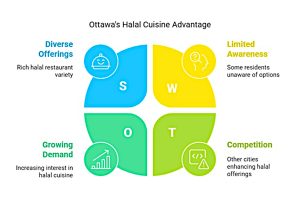
Frequently Asked Questions
How do you ask if a restaurant is halal?
Simply ask, “Is your restaurant halal-certified?” or “Do you serve halal meat?” Most Ottawa restaurants will happily answer and show their certification if it is available.
What are the rules of halal food?
Halal food must come from permitted animals slaughtered adequately by a Muslim, contain no alcohol or pork products, and be prepared with separate utensils from non-halal foods.
How can you tell the difference between halal and haram food?
Ask restaurant staff about their meat sources and preparation methods, and check ingredients for alcohol, pork derivatives, or other prohibited items.
What food ingredients are not halal?
Pork and pork derivatives, alcohol, blood products, non-certified meat, certain food additives like non-halal gelatin, and some food colorings are not halal.
